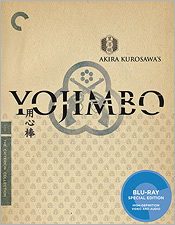Yojimbo (Blu-ray Review)

Director
Akira KurosawaRelease Date(s)
1961 (March 23, 2010)Studio(s)
Toho (Criterion - Spine #52)- Film/Program Grade: A+
- Video Grade: B+
- Audio Grade: B
- Extras Grade: A
Review
If you’re looking for the no-fail, crafted-for-the-masses, mainstream Kurosawa film, Yojimbo is your go-to choice. It has all of the necessary ingredients for a thoroughly engaging movie experience. It’s laugh out loud funny, with thrilling action and features Toshirô Mifune in what is arguably his signature role. It’s simply impossible not to love Yojimbo if you’re a fan of samurai films, Japanese cinema in general or Kurosawa in particular.
Yojimbo is Kurosawa’s ode to Dashiell Hammett, with a liberal dash of filmmaker John Ford added for good measure. And yet, the film stands all on its own. This is Kurosawa being Kurosawa, inspired by the things he loved from around the world – in this case, gumshoe detective novels about corrupt politicians and broken men, as well as the good old American western. And though Yojimbo would become the mold for the Italian “spaghetti western” genre – which would itself inspire later American westerns – at its core, Yojimbo is a tale that could only exist in Japan.
Mifune stars as a ronin samurai (a.k.a. “Sanjuro”) – a man of honor without a master to defend. He’s disheveled, flea-ridden and hungry. On the road he travels, he comes to a fork and lets fate choose a path for him. This takes him to a village being torn apart by two warring families. One controls the local textile industry, the other controls the sake industry. Sanjuro sees that this village needs a good reset and inserts himself into the politics. Essentially, he furthers along the families’ war, effectively helping them destroy themselves. All of this goes well until a young warrior related to one of the families comes home with Western ideas and a gun, upsetting the balance. (The story is set towards the end of the Tokugawa period of Japan – right around the time of the American Civil War.) Sanjuro adjusts his plan, but not without heavy cost.
Yojimbo is an awesome movie in every way. It’s an almost perfect samurai film, from a Western perspective. In fact, this is what the samurai genre would aspire to be from this point forward. The film broke new ground, made Japanese cinema popular the world over, and catapulted Mifune to international stardom. The film even inspired director Sergio Leone to make Fistful of Dollars. (Mifune’s character was the prototype for the infamous Man with No Name. He calls himself “Kuwabatake Sanjuro,” which literally means “Thirty Year-Old Mulberry Field” – the object he was looking at when he made it up, with his age tacked on.) It’s just impossible not to love Yojimbo.
Criterion’s new Blu-ray edition of Yojimbo is a direct upgrade of the 2007 DVD release. The film is now offered in stunning 1080p high-definition. Contrast is very good, with deep, detailed blacks and overall image texture is nicely refined. Very light grain remains, preserving the proper film-like experience. Thanks to the restoration work, age-related issues are minimal. Slight variation in contrast and detail is visible from scene to scene, but other than the occasional missing frame (presumably damaged, also seen on the DVD), the visual presentation is consistently excellent.
The Japanese audio is present in two formats: lossless LPCM 1.0 mono and a DTS-HD MA 3.0 lossless presentation, recreating the original “Perspecta” theatrical experience. Of these, the 3.0 track is definitely the more engaging, though overall fidelity is excellent on both tracks. This is about as good looking and sounding as you’d ever hope to experience this film.
We’re also pleased to report that the disc reproduces exactly the extras from the 2007 DVD release, including the excellent audio commentary with film historian Stephen Prince, the 45-minute documentary on Yojimbo from Toho’s Akira Kurosawa: It Is Wonderful to Create series, the teaser and theatrical trailers and the gallery of behind-the-scenes photographs. You also get a page-for-page reproduction of the DVD’s liner notes booklet, albeit reproduced at a smaller size to fit the Blu-ray packaging. It’s an outstanding and very welcome Blu-ray upgrade of an already great DVD release.
- Todd Doogan

